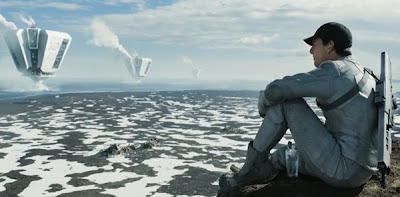Oblivion Review
Searching for depth where none exists
Full, spoiler-free review by Isaac Handelman
Recent films like Inception have proved that huge audiences exist for complex, narrative-driven blockbusters, which has led many studios to incorporate mind-bending stories into their big-budget pics, rather than the usual straightforward, mindless fun that blockbusters promise. These types of films have the potential to impress with intricately woven plots and the mature expectancy of their viewers to be capable of comprehending narrative complexity. Oblivion wants so badly to be held in this regard that it too often loses its way.
Tom Cruise takes center stage as Jack Harper, a drone repairman on a radiation-ridden, post-alien-invasion Earth. Though humanity emerged “victorious” from the war, the planet was rendered uninhabitable in the process and the human race was evacuated to a giant floating space-station called the Tet for later transport to a permanent colonization location. As Harper puts it, he’s the mop-up crew, and his main job consists of skirmishing the remaining aliens on Earth, called “scavengers”, while simultaneously keeping the last operations on the planet up and running. Just two weeks from his planned departure, Jack comes across a crash-landed vessel containing human survivors, a discovery which leads him to realize that everything is not as it seems.
It’s difficult to go too far past this point without giving up some pretty major spoilers, so I won’t. Suffice to say, though, that a ludicrous twist follows soon after. The film doesn’t bother to explain itself for quite a while, so viewers will be left scratching their heads for a sizeable chunk of Oblivion’s latter half. When the film finally does decide to explain itself, nothing comes together as nicely as it could (or should).
Though I found myself recalling a few past events that were given added clarity after the revelation, the main ramifications of the twist are convoluted and under-explained -- in fact, it seems the screenwriters weren’t entirely certain just how to explain most of what they cooked up. Adding to all the unnecessity are the film’s half-baked romantic elements, which take up an aggravating amount of screen-time and are neither interesting nor the least bit needed, serving only to complicate things even further. Much of the second half of Oblivion’s narrative seems stuck in the concept stage.
 |
| Oblivion's most impressive moments come when it shows off its scenery. |
And that’s a shame, really, because Oblivion shows loads of potential. Visually, the film is stunning, and its production design second to none. Oblivion’s bold vision of a ruined Earth is consistently breathtaking; the film seems to have an endless stream of stunning, creative vistas to showcase. From ruined football stadiums to buried skyscrapers to gargantuan waterfalls and beyond, Oblivion ensured I never felt cheated out of the $10 my ticket cost; the simple act of marveling at an everlasting stream of awe-inspiring backdrops and sleek, superbly designed futuristic technology and architecture was enough to justify the price of admission.
In fact, I found the first chunk of the film to be far and away its most enjoyable portion, as we the viewers were asked to sit back, relax and feast on the gorgeous post-apocalyptic landscapes as Harper peruses them for broken drones. Though the main conflict is nonexistent as this point, the quiet exploration that the film offers up during its initial portion proves to be more engaging than anything it offers past that point.
 |
| This is about as interesting as Morgan Freeman's character gets. |
The disappointment that the film’s latter section brings isn’t softened by the underused Morgan Freeman character. The veteran actor is as dependably solid as ever, but he feels almost wasted, limited to just twenty-or-so minutes of screen-time. His character is a painfully generic rebel leader whom any follower of cinema has been introduced to many times before.
Tom Cruise delivers a predictably Tom Cruise-y performance, and that’s not a bad thing. In roles like this, Cruise isn’t asked to flex the dramatic muscles that he’s been proven to have, but that’s okay, because the actor has perfected the charismatic action hero persona, and continues to exercise that skill here. Outside of those two, the performances range from passable to good, and the characters are entirely unmemorable (save for one rebel lieutenant, who’s given an amusing sort of mini-story-arc, and seems to stick around for the sole purpose of being a badass).
From a visual standpoint, Oblivion is breathtaking and extraordinarily memorable. It’s so stunning, in fact, that I would have been entirely willing to forgive a straightforward, popcorn-flick-style narrative that just let me see the sights on hand, so long as it provided a good time. Oblivion annoyingly insists on being something more -- something that it neither needs to do nor succeeds at doing. I can wholeheartedly endorse giving the film a watch for its visual splendor and intriguing premise, but the convoluted plot and disjointed complexity harm the experience considerably.



Disjointed complexity?
ReplyDeleteUnlike in most other scifi and action movies I've seen in recent years, everything is explaind and fits together. Claims of plotholes and nonsense are always based on the viwer missing something, or not understanding the quite straight forward (but not straight forward-ly reveled) plot (I've spend quite a lot of time trying to find out why people don't like this movie so much, trust me, most of the critizism about the plot are explained in the movie if you care to pay attention).
Oblivion is much less complex than Inception. The difference is, Inception uses a lot of time to explain everything in an easy to follow fashion before we see it.
Oblivion is more like a thriller/mistery plot. Clues are everywhere, even in performances of actors (that are criticized as bad acting by people who don't get the meaning behind their behaviour). Everything is revealded gradually, we see a lot of it comming, but we're supposed to guess at it and are given the chance to find out ourselfes, so that's fine.
I really don't get it. Finally, a scifi with "intricately woven plots and the mature expectancy of their viewers to be capable of comprehending narrative complexity", and people think it's dumb. People who ask for this kind of stuff think it doesn't make sense. And judging from what I've seen on the internet, it's because people didn't care to pay attention while watching it.